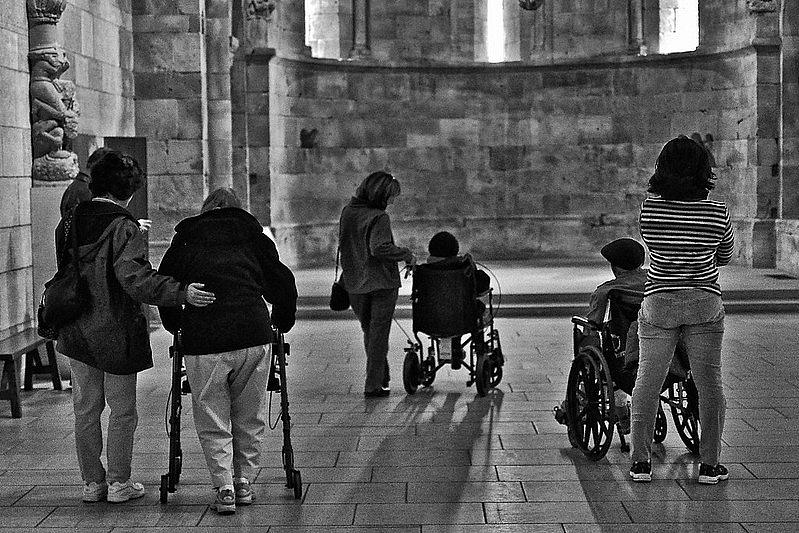Why is Alzheimer’s taking such a devastating toll on African American families?

(Photo by Global Panorama via Flickr/Creative Commons)
Recent research is showing positive signs for potential treatments to prevent memory loss in patients with Alzheimer’s disease, according to researchers at Johns Hopkins University School of Medicine.
Researchers have reportedly found a protein that appears in greater amounts in the brains of people suffering from the disease. That has to be music to the ears of Alzheimer’s patients and their families.
Unfortunately, it’s too late for Rose, who didn’t know what to do with her beloved father-in-law, whose Alzheimer’s progressed rapidly. He was in the late stages of Alzheimer’s and could no longer be left alone. Neither she nor her husband was trained to take care of him. Her father-in-law was a black man in his early 70s, who had suffered from the disease for nearly a decade.
Due to his advanced stage of dementia, Rose was forced to cover his furniture in plastic due to his forgetfulness in wearing his diapers.
She remembers watching helplessly as her father-in-law withdrew more and more sending her husband and herself into a form of depression. After nearly a decade of heartache and confusion, her father-in-law died. Rose admitted to feeling a form of relief.
Rose’s experience is just one of the heartbreaking stories of Black families with loved ones diagnosed with Alzheimer’s.
The topic is the subject of my 2021 California Fellowship, ‘The Frequency of Cognitive Impairment or Alzheimer’s on the Black Community in Los Angeles.’
I want to know why being Black puts me at a higher risk.
My research will focus on how and why this silent epidemic is more prevalent among Blacks than among whites and other ethnic groups.
The project will touch upon the fact that “One Alzheimer’s Does Not Fit All” — there is more than one kind of Alzheimer’s. The project is tentatively scheduled to run as a three-part series published over a three-month period.
Part 1 will focus on the impact of Alzheimer’s and dementia on communities of color, specifically the Black community. Research has shown that Alzheimer’s has a significant impact on people of color, but there has been little to no exploration of the actual causes behind this. Why are Blacks, Native Americans, and Hispanics more susceptible to the disease? Is there evidence of a direct correlation between the disease and the health disparities that have plagued communities of color for generations? Do racism, education, unemployment, and where someone lives play a role? Does lack of access to health care increase the risk? What are the influences of someone’s early-life difficulties on the cognitive decline in older Blacks and whites?
Part 2 will focus on the advancements in clinical research that have been made toward a cure for Alzheimer’s. A number of interviews will be conducted with medical experts in the field. Questions will include: What are the typical symptoms and treatments available, and how effective are they? How do we convince people of color of the importance of early detection and diagnosis, and how do we convince them to be proactive rather than reactive about their health?
According to the Alzheimer’s Association, data from a large-scale longitudinal study indicates that persons with a history of either high blood pressure or high cholesterol are twice as likely to get Alzheimer’s disease. Those with both risk factors are four times as likely to suffer demenita.
Part 3 will offer an up close and personal look at the disease. I’ll talk to individuals diagnosed and currently experiencing Alzheimer’s, and their caregivers. What effect does it have on their families, who are often their caregivers? What effect does it have on families who place family members in homes? Part of my research will take a look at the emotional toll Alzheimer’s takes on family members who are also caregivers. Why aren’t Black families more aware of available resources?
At what point should a family consider putting a loved one in a home? What are the stress factors associated with taking on the care of a loved one who no longer knows who you are? I’ll discuss the traditions of Black families taking care of their elderly, and the weight placed on the shoulders of the caregiver.
One of the most vicious diseases ever, Alzheimer’s is an irreversible, progressive brain disorder that slowly destroys memory and thinking skills and, eventually, the ability to carry out the simplest tasks. In most people with the disease, symptoms first appear in their mid-60s.
Alzheimer’s is known as a disease of lost memories, but there are so much more patients and families have to deal with. Memory loss is just the beginning. Alzheimer’s disease also brings on anxiety, agitation, depression, and sleep-related problems.
Today, there are nearly six million Americans with the disease, according to the Alzheimer’s Association, and that number is expected to nearly triple by 2050. The significant increase in the number of people diagnosed with Alzheimer’s will be a looming public health crisis as society deals with their diminished quality of life, the potentially extraordinary costs of caregiving, and the economic demands made on younger generations.
Through research and interviews with doctors, researchers, Alzheimer’s patients, family members, and more, I’d like to take a deep dive into the who, how and why of this memory bandit.

